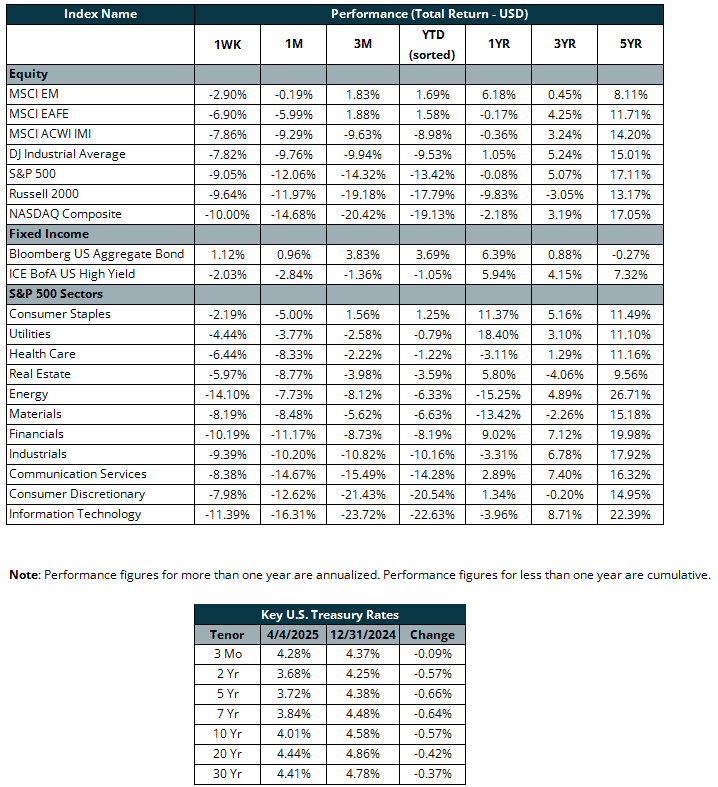Volatile Market Fueled by Tariffs and Economic Uncertainty

by Sequoia Financial Group

by Sequoia Financial Group
U.S. financial markets experienced heightened volatility last week following President Donald Trump’s announcement of sweeping import tariffs on over 60 countries. The measures include a 10% baseline tariff on all exporting countries, with additional rates (“reciprocal tariffs”) targeting specific countries and regions: 34% on China, 24% on Japan, and 20% on the European Union. The policy, which aims to support domestic manufacturing, has raised concerns over rising inflation and a potential slowdown in economic growth.[1] In retaliation, China announced on Friday it will impose a 34% tariff on all U.S. imports starting April 10, stoking worry of an extended trade war.[2]
Last week marked the worst week for equities since March 2020. Thursday saw particularly steep losses, with the Dow Jones Industrial Average tumbling nearly 1,700 points, the S&P 500 falling 5%, and the NASDAQ dropping 6%. The Russell 2000 entered bear market territory, down more than 20% from its peak.[3][4] Technology stocks were hit particularly hard, as the NASDAQ 100 shed $1.4 trillion in market capitalization.[5] By Friday, futures pointed to further declines, and the S&P 500 had erased $5.2 trillion in market value in two weeks.[6]
Amid the equity market turmoil, investors flocked to U.S. Treasuries, pushing the yield on the 10-year Treasury below 4% for the first time since President Trump’s re-election in late 2024. Yields dropped from 4.2% to 4%, nearing six-month lows, as economic uncertainty surrounding the new tariff policy deepened. Bond traders ramped up expectations for Federal Reserve rate cuts, pricing in up to four quarter-point reductions this year.[7][8] The bond market also saw a sharp reaction in riskier segments. A broad selloff in junk bonds significantly depressed the value of lower-rated corporate debt, stalling new issuances.[9]
Rising concerns about stagflation––a mix of slowing economic growth and persistent inflation—have prompted investors to shift toward safe-haven assets like gold, which has reached record highs in 2025, and bonds, as a hedge against mounting market volatility.[10] Federal Reserve Chairman Jerome Powell warned that the unexpectedly large tariffs risk fueling inflation while dampening growth and employment, putting the Fed in a difficult position as it navigates future interest rate decisions.[11]
Further complicating the outlook was Friday’s March jobs report, which offered mixed signals. The U.S. economy added 228,000 jobs in March, well above expectations and a sharp rise from February’s downwardly revised total of 117,000. However, signs of underlying softness emerged, with slowing hiring in certain sectors and rising uncertainty linked to tariffs and federal workforce reductions. The U.S. unemployment rate rose to 4.2% in March 2025, the highest level since November and slightly above market expectations of 4.1%.[12] While the strong headline data suggests resilience, it also pressures the Fed to hold off on rate cuts. Several Federal Reserve officials, including Powell, emphasized a cautious approach, with markets now expecting the first cut no earlier than June. [13]

[1] https://apnews.com/article/trump-tariffs-us-world-reaction-5b8411d056e013015a0df6227b41dd5b
[2] https://www.theguardian.com/us-news/2025/apr/04/china-donald-trump-tariffs-recession–us-stock-market
[3] https://www.cnbc.com/2025/04/02/stock-market-today-live-updates-trump-tariffs.html
[4] https://www.npr.org/2025/04/03/nx-s1-5350576/u-s-stocks-fall-tariffs-global-trade-war
[5] https://www.barrons.com/articles/stock-market-movers-fcaf92ec
[6] https://www.bloomberg.com/news/articles/2025-04-04/us-stock-futures-sink-as-china-retaliates-against-trump-tariffs
[7] https://www.ft.com/content/25e49d20-27e0-4850-9235-a98bb0adf9c9
[8] https://www.wsj.com/livecoverage/stock-market-tariffs-trade-war-04-04-2025/card/treasury-yield-falls-below-4-on-recession-fears-qbkvMTOgiKT0pRxvQLHp
[9] https://www.bloomberg.com/news/articles/2025-04-04/global-junk-bonds-extend-selloff-premiums-at-november-2023-high
[10] https://www.marketwatch.com/story/how-investors-can-navigate-stagflation-worries-sparked-by-white-house-policies-440e3edc
[11] https://www.theguardian.com/us-news/2025/apr/04/trump-tariffs-higher-inflation-slower-growth-fed-chair
[12] https://apnews.com/article/jobs-economy-unemployment-inflation-federal-reserve-trump-d43b08bda57cb5d90b5bac1f092e1f3d
[13] https://www.cnbc.com/2025/04/04/powell-sees-tariffs-raising-inflation-and-says-fed-will-wait-before-further-rate-moves.html
The views expressed represent the opinion of Sequoia Financial Group. The views are subject to change and are not intended as a forecast or guarantee of future results. This material is for informational purposes only. It does not constitute investment advice and is not intended as an endorsement of any specific investment. Stated information is derived from proprietary and nonproprietary sources that have not been independently verified for accuracy or completeness. While Sequoia believes the information to be accurate and reliable, we do not claim or have responsibility for its completeness, accuracy, or reliability. Statements of future expectations, estimates, projections, and other forward-looking statements are based on available information and Sequoia’s view as of the time of these statements. Accordingly, such statements are inherently speculative as they are based on assumptions that may involve known and unknown risks and uncertainties. Actual results, performance or events may differ materially from those expressed or implied in such statements. Investing in equity securities involves risks, including the potential loss of principal. While equities may offer the potential for greater long-term growth than most debt securities, they generally have higher volatility. Past performance is not an indication of future results. Investment advisory services offered through Sequoia Financial Advisors, LLC, an SEC Registered Investment Advisor. Registration as an investment advisor does not imply a certain level of skill or training.







Volatile Market Fueled by Tariffs and Economic Uncertainty